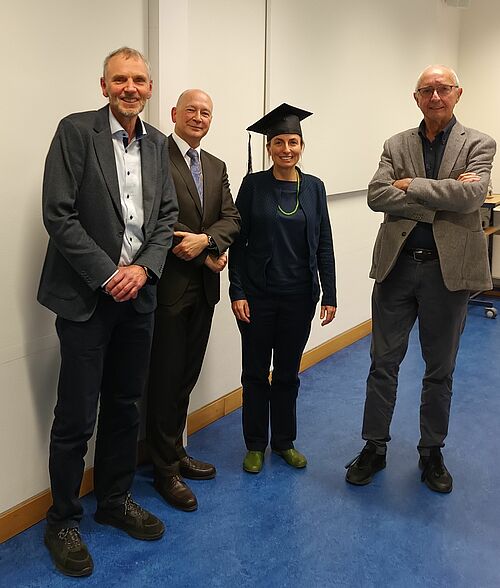On November 7, 2022, Susanne Marx, PhD student from Stralsund University at the Chair of Business Information Systems, successfully defended her doctoral thesis. The topic of the thesis was “Contributions to Participative Innovation in Tourism Network Organizations ". The reviewers were Prof. Kurt Sandkuhl and Prof. Friedemann Nerdinger (Rostock University), who jointly supervised the thesis in close cooperation with Prof. Michael Klotz (Stralsund University). The result of the defense was the recommendation to the university to award the doctoral degree "Dr. rer.pol.", as the thesis was judged to be very good. The photo shows Prof. Kurt Sandkuhl, Prof. Michael Klotz, Dr. Susanne Marx and Prof. Friedemann Nerdinger.
Abstract
The doctorate examines the implementation aspects of innovation activities in tourism networks. Innovation activities are organized across organizational boundaries as open innovation with an increasing focus on networks. However, innovation activities challenge network organizations because innovation projects require different practices than usual. The tourism sector is particularly suitable for study due to the many micro and small companies that jointly offer the tourist service - often orchestrated by destination management organizations. The present work provides contributions to deepen the understanding of innovation processes in tourism and to shed light on the participation of external actors in innovation activities initiated by inter-organizational structures. Three levels of innovation activities in tourism are examined for their challenges and approaches: innovation activities of tourism entrepreneurs with their ecosystem, innovation activities of destination management organizations with companies in the network, and innovation activities of inter-organizational project consortia with the project ecosystem. On the first level show how tourism small and micro-enterprises use diverse innovation activities in a crisis, flexibly integrating people from their business and personal ecosystem and associating both the innovation as a result and the innovation activities as such with benefits. On the second level, the challenges of the destination management organization regarding digital transformation are examined, pointing to the role of the DMO in portfolio management and the associated participation mechanisms for incorporating network actors. The third level shows that inter-organizational structures implement open innovation activities beyond the inter-organizational boundaries, calling for specific implementation routines. The study develops and tests a process model for open innovation initiatives by inter-organizational projects, attributing the negotiation of joint and individual goals of the project partners involved as the essential element. Four challenges emerge across the studies: balancing temporary and non-temporary organizing, balancing the participation of actors who represent organizations or act privately, balancing individual and joint interests, and the establishment of routines that both enable efficiency but allow the necessary flexibility for innovation projects. The three published contributions lead to the representation of innovation activities in tourism as a project network. In that project network, time-limited projects are implemented continuously and flexibly with the participation of network partners and representatives of the ecosystem of one or more actors in the network embedded in non-temporary relations. The role of the destination management organization can be interpreted as a network administrative organization with responsibilities as a project management office. Finally, the work presents four propositions for representing the tourism innovation project network based on the 4Rs (Responsibilities, Routines, Roles, Relationships) of governance.

